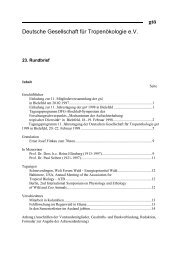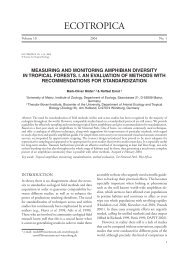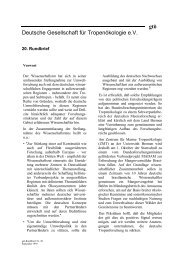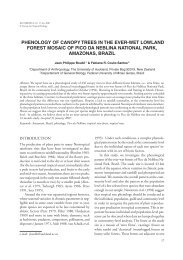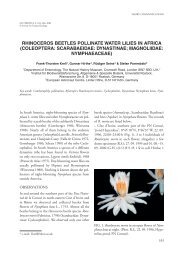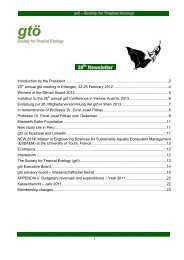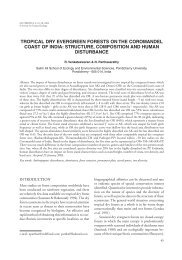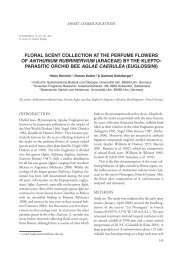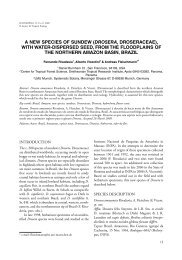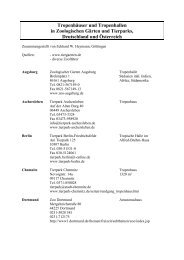132 PARALLEL SESSION HALL H IV | FREE CONTRIBUTIONSPARALLEL SESSION HALL H III | TROPICAL ECOLOGISTS AT WORK133Thursday, 24 February, 10:45, Hall H IVBIOGEOGRAPHY AND CENOZOIC CLIMATE CHANGE: ON THEOCCURRENCE OF TROPICAL FORMS IN GRUBE MESSEL AND OTHERMID-LATITUDE FOSSIL SITESKrister T. Smith 11 Dept. of Palaeoanthropology and Messel ResearchForschungsinstitut und Naturmuseum SenckenbergFrankfurt, GermanyTHURSDAY 10:45 Hall H IVGrube Messel, near Frankfurt, Germany, is renowned <strong>for</strong> the extraordinarypreservation of its fossils. One of the most remarkable aspects of the speciescomposition at Messel is the prevalence of poikilothermic <strong>for</strong>ms that todayare predominantly found at low elevation in tropical to subtropical latitudes.These occurrences are wholly consistent with the warm and equabletemperatures and high precipitation rates suggested by independent datasources <strong>for</strong> the early Paleogene, particularly the Eocene. Yet these occurrencedata can be explained by different biogeographic models, and understandingtheir significance <strong>for</strong> modern patterns of biodiversity requires a diachronicperspective. I review studies of squamate (lizard and snake) occurrences at midlatitudesthroughout the Eocene. Predominantly tropical <strong>for</strong>ms – especiallyvarious members of Anguidae and Iguanidae – first appear at middle latitudesnear the base of the Eocene and disappear from those latitudes near the closeof the epoch. This pattern of appearance and disappearance coincident withepisodes of significant climatic change suggest that climate is responsible<strong>for</strong> major biogeographic shifts which may have contributed to the observedlatitudinal diversity gradient. Yet a Paleogene perspective from the tropicallatitudes, necessary <strong>for</strong> more closely testing these results, remains elusive.Parallel session: Thursday, 24 February, 11:30, Hall H IIITROPICAL ECOLOGISTS AT WORK:WHERE AND HOW TO FIND A JOBChair: Manfred NiekischContact: Manfred.Niekisch@stadt-frankfurt.deA number of organisations, ranging from non governmental organisationsand private consultancy companies to government institutions presentthemselves and describe the role of and working opportunities <strong>for</strong> tropicalecologists (and scientists in related fields) within their structures and areas ofactivity. The session aims at assisting students and young academics to get anoverview and orientation over different occupational images, job descriptionsand potential careers and employees.THURSDAY 11:30 Hall H IIIgtö<strong>Society</strong> <strong>for</strong> <strong>Tropical</strong> <strong>Ecology</strong> | Gesellschaft für Tropenökologie e.V. Status and future of tropical biodiversity | Frankfurt, 21 - 24 February 2011gtö
134 PARALLEL SESSION HALL H III | TROPICAL ECOLOGISTS AT WORKPARALLEL SESSION HALL H III | TROPICAL ECOLOGISTS AT WORK135Session: <strong>Tropical</strong> ecologists at work: where and how to find a jobThursday, 24 February, 11:30, Hall H IIIBROAD-BASED EXPERTISE FOR SUSTAINABLE DEVELOPMENT- UNDER ONE ROOF - Deutsche Gesellschaft für InternationaleZusammenarbeit (GIZ) GmbHnetworking and dialogue among international cooperation actors. Capacitybuilding <strong>for</strong> partner-country experts is a key component of our services, andwe offer our programme participants diverse opportunities to use the contactsthey have made. We also give young people a chance to gain professionalexperience around the world – exchange programmes <strong>for</strong> young professionalslay the foundations <strong>for</strong> successful careers in national and international markets.THURSDAY 11:30 Hall H IIIHarald LossackBroad-based expertise <strong>for</strong> sustainable development – under one roofWorking efficiently, effectively and in a spirit of partnership, we supportpeople and societies in developing, transition and industrialised countries inshaping their own futures and improving living conditions. This is what theDeutsche Gesellschaft für Internationale Zusammenarbeit (GIZ) GmbH is allabout. Established on 1 January 2011, it brings together under one roof thelong-standing expertise of the Deutscher Entwicklungsdienst (DED) gGmbH(German Development Service), the Deutsche Gesellschaft für TechnischeZusammenarbeit (GTZ) GmbH (German technical cooperation) and InWEnt– Capacity Building International, Germany. As a federally owned enterprise,we support the German Government in achieving its objectives in the field ofinternational cooperation <strong>for</strong> sustainable development. We are also engaged ininternational education work around the globe.Making development effectiveOur partners want to take responsibility <strong>for</strong> achieving their own long-termdevelopment goals. We support them by offering demand-driven, tailor-madeand effective services <strong>for</strong> sustainable development. We apply a holistic andvalue-based approach to ensure the participation of all stakeholders. In doingso, we are always guided by our concept of sustainable development. We takeaccount of political, economic, social and ecological dimensions as we supportour partners at local, regional, national and international level in negotiatingsolutions in the broader social context. This is how we drive development.GIZ operates in many fields, including economic development andemployment; governance and democracy; security, reconstruction, peacebuilding and civil conflict trans<strong>for</strong>mation; food security, health and basiceducation; and environmental protection, resource conservation and climatechange mitigation. We also provide management and logistical services to helpour partners per<strong>for</strong>m their development tasks. In crises we carry out refugeeand emergency aid programmes. As part of our development services, we alsosecond technical advisors to partner countries.We advise our clients and partners on drawing up plans and strategies, placeintegrated experts and returning experts in partner countries, and promoteWho we work <strong>for</strong>Most of our activities are commissioned by the German Federal Ministry <strong>for</strong>Economic Cooperation and Development (BMZ). GIZ also operates on behalfof other ministries – in particular the Federal Foreign Office, the FederalEnvironment Ministry and the Federal Ministry of Education and Research– as well as German federal states and municipalities, and public and privatesector clients both in Germany and abroad. These include the governmentsof other countries, the European Commission, the United Nations and theWorld Bank. We work closely with the private sector and promote resultsorientedinteraction between the development and <strong>for</strong>eign trade sectors. Ourconsiderable experience with alliances in partner countries and in Germany isa key factor <strong>for</strong> successful international cooperation, not only in the business,academic and cultural spheres but also in civil society.The company at a glanceGIZ operates in more than 130 countries worldwide. In Germany we maintain apresence in nearly all the federal states. Our registered offices are in Bonn andEschborn. GIZ employs approximately 17,000 staff members worldwide, morethan 60% of whom are local personnel. In addition, there are 1,135 technicaladvisors, 750 integrated and 324 returning experts, 700 local experts in partnerorganisations and 850 ‘weltwärts’ volunteers. With an estimated turnover ofEUR 1.9 billion as at December 2010, GIZ can look to the future with confidence.Growing commitments <strong>for</strong> biodiversity, <strong>for</strong>ests and ecosystems‘conservationThe German Government has recognised the importance of biodiversity andthe necessity to take action on a global scale. In recent years, funding in the<strong>for</strong>m of long-term pledges to partner countries has risen steeply; in 2009 itrose to approximately €260 million, which is a 30 % increase on 2008. Furthersignificant increases are planned between now and 2012. From 2013, theGerman Government intends to make €500 million available each year tosupport the worldwide creation of the enabling environments and capacitiesneeded to preserve global biodiversity and <strong>for</strong>ests in the long term.THURSDAY 11:30 Hall H IIIgtö<strong>Society</strong> <strong>for</strong> <strong>Tropical</strong> <strong>Ecology</strong> | Gesellschaft für Tropenökologie e.V. Status and future of tropical biodiversity | Frankfurt, 21 - 24 February 2011gtö



